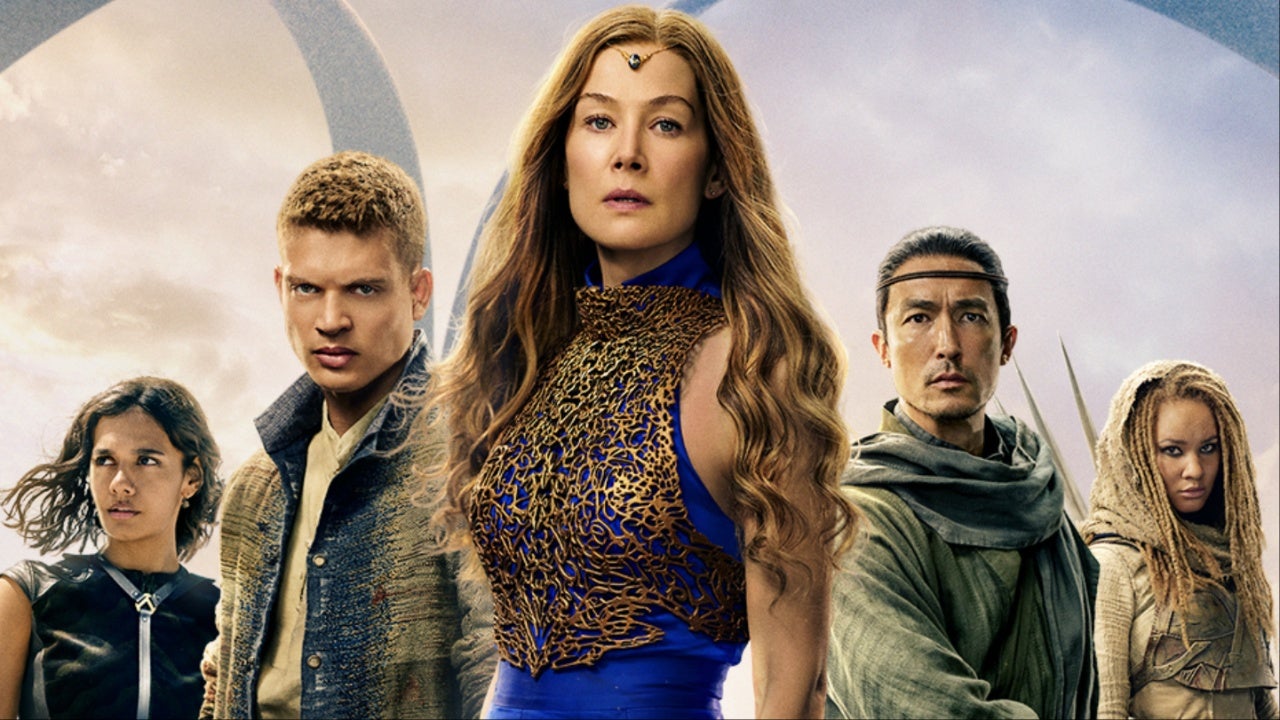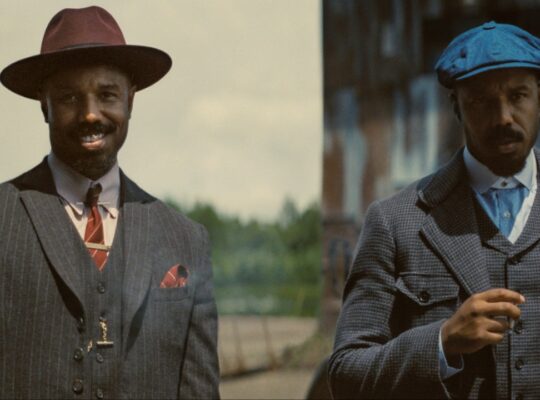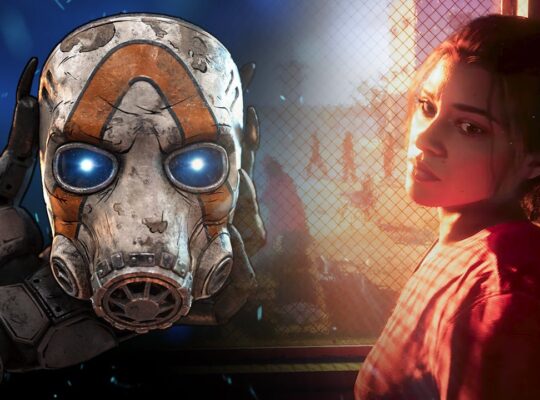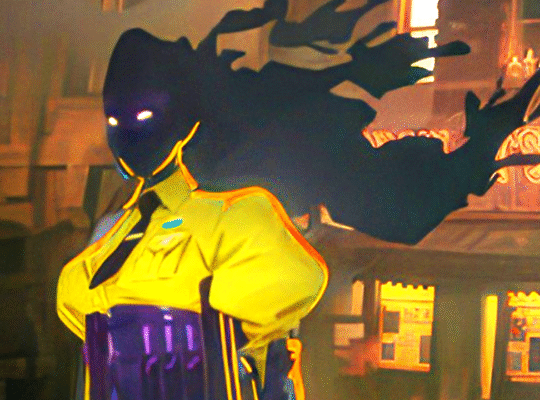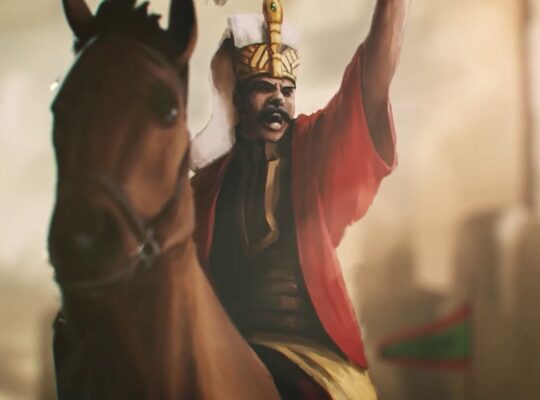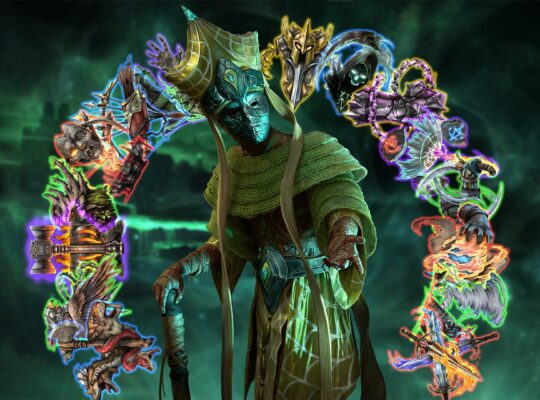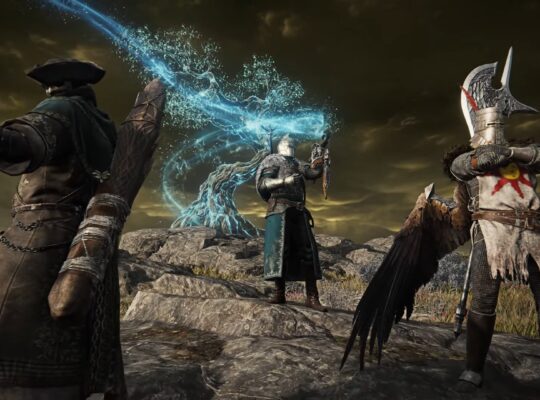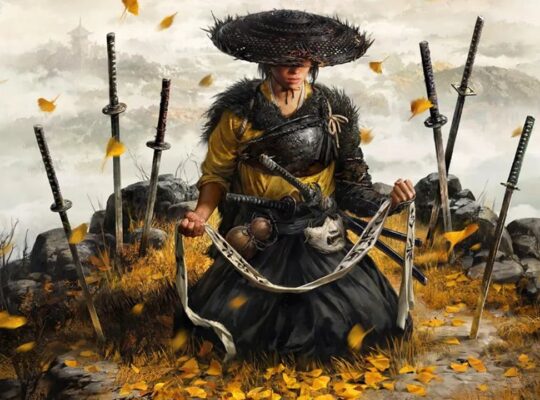
It’s fair to say the recent announcement of a The Wheel of Time video game being in the works caught fans by surprise — and sparked a healthy dose of skepticism online.
The announcement, reported first by Hollywood trade publication Variety, described an upcoming “AAA open-world role-playing game” for PC and consoles based on Robert Jordan’s much-loved 14-book series The Wheel of Time. A three-year development period was also mentioned.
It’s in development at iwot Studios’ new Montreal-based game developer, which is led by former Warner Bros. Games executive Craig Alexander. Alexander oversaw development for all Turbine (now WB Games Boston) franchises, including The Lord of the Rings Online, Dungeons & Dragons Online, and Asheron’s Call. This, on the face of it, would normally spark significant excitement from fans. But it’s the name iwot Studios, which acquired the rights to The Wheel of Time (as Red Eagle Entertainment) in 2004, and this talk of an unlikely three-year development process that has raised more than a few eyebrows.
A cursory online search of iwot Studios reveals the company has a fractured relationship with the hardcore The Wheel of Time fanbase. I found multiple posts from skeptical fans about the business, with some accusing iwot of being an “IP camper.” Others believe iwot has “squandered” The Wheel of Time IP over the years, with multiple projects that failed to go anywhere. Fans often point to a 10-year-old reddit post that goes even further with the complaints.
This, coupled with a collective scoffing at the idea that a brand new video game development studio can essentially come from nowhere and turn around a triple-A RPG that matches The Wheel of Time fans’ expectations, has led to a “we’ll believe it when we see it” attitude online.
However, The Wheel of Time has found significant recent success with its Amazon Prime Video TV series, which just wrapped up Season 3 (Season 4 is yet to be announced). The show has exposed The Wheel of Time to a new army of fans, and, after upsetting the core fanbase with significant story changes in Seasons 1 and 2 compared to the books, did well to turn the narrative around with a much-improved Season 3.
It’s with all this in mind that I set out to learn more from iwot Studios itself. Over a video call, I spoke with Rick Selvage, boss of iwot Studios, and Craig Alexander, studio head for the company’s video game efforts, to get a better understanding of where the project is at, its scope, what fans can expect, and to put all that online criticism to them for a response.
IGN: How did the video game project come to be?
Rick Selvage: We have a very big, deep story to tell, and we also happen to control the rights through to The Wheel of Time, including all interactive rights. And video games are a major platform, fan platform, for any IP like The Wheel of Time. So of course we were going to do video games. The question is when and what type and how we’re going to enter the marketplace? So we felt the time is right to now do that.
IGN: Can you give me some detail on the setup you have to realize that vision? You’re talking about doing a triple-A open-world role-playing game here. A lot is required to make something like that happen to a certain quality level. Exactly what sort of scope do you have for this? What setup do you have now? Where do you hope to get to in the future?
Craig Alexander: First step is team formation to get started. The plan is to work with the franchise for many years and develop a series of games, sequels, expansion packs, DLC, et cetera, and build out as much of the world we can. And given that we have an expansive set of rights with one of the greatest fantasy IPs in the world, it’s a labor of love and we’re looking forward to getting started.
But how we’re going to break that up over time is something that needs to be sorted out in pre-production. But we’re confident that given the richness of the material, we’re going to be able to build out much of the world. And you had mentioned complexity. We fully realize these are big games to build. This is a big IP. I’ve had experience doing quite a bit of fantasy games, building MMOs, which are the biggest and hardest games to do of all. I helped pioneer the genre, and believe this is the right time for a great Wheel of Time immersive experience, and the fans have been asking for it for many, many years.
IGN: It sounds to me like you are just getting started on this really, that it’s not like you’ve got hundreds of developers working away on the game at the moment. Is it the case that you need to start hiring aggressively to get this going?
Craig Alexander: Yes. We’re actively recruiting a leadership team now. We’re going to be having some announcements shortly as we fill out the leadership team. Then we’re going to build a prototype team that’s going to be fairly small, less than 20 to 30 people over time, build out our prototype, build up the vertical slice, and then eventually go into production where we’re going to have upwards of 200-300 staff.
Those numbers are fairly typical for building this scope of a world. As you had mentioned, these are large games, but then as I had mentioned before, because we plan on having a sequel strategy from the outset, building out the entire experience is something that we’re going to need to plan for, because I am certain that the fans will want more and we’d like to tell the whole story. And this is true of other big fantasy and science fiction IPs where there’s a lot of content to work with.
IGN: Is it the case that you plan to self-fund and self-publish the project? Or will you take that vertical slice to market and try and get a publisher on board?
Rick Selvage: No. First of all, it won’t be self-funded. We will have substantial funding to build out the company, so that’s not an issue. And in regards to publishing, I think it’s way too early to commit to publishing either ourselves or another publisher. As you know, over the next years technology and business models will change dramatically, and we’re in a position that we don’t have to make those commitments now. We just have to focus on making and developing the best game.
Craig Alexander: I would add the focus that I had mentioned on hiring is for a development studio. The publishing functions, as Rick said, come much later.
IGN: I’m asking this because you’ve probably seen all the questions under the sun on the internet as a result of the announcement, and one of them is around the backing that you might have to realize this vision. When you go out and say a triple-A open-world role-playing game, that creates a level of expectation among fans because they know what a triple-A open-world role-playing game looks like these days, and that’s not cheap. We’ve seen modern triple-A game budgets balloon in recent years to hundreds of millions of dollars. So I think there are questions around how you can realize that without having huge investment to make it happen.
Rick Selvage: We understand the financial requirements to build a game like this. Craig has been around that business and certainly ran all development for the Lord of the Rings Online MMO, with a few hundred developers. And we understand the costs, we understand the challenges, and that’s why we’re putting the leadership team now that are capable of doing that. And the funding aspect of it is that we have no concerns about having the investment in order to reach the goals that we’re establishing today with our Montreal studio.
IGN: The announcement mentioned a three-year development process for the game.
Rick Selvage: Yeah, well the three years, I don’t know where that came from.
IGN: I was going to say, that sounds very ambitious.
Rick Selvage: The issue we’ve always had with the Wheel of Time is that there’s excited fans out there, which is great, and there’s a lot of misinformation that is started that is nowhere near accurate. We’ve just decided we’re going to do our thing and make television and games and movies, and rather than attempt to put out any information that pops up… but at this point is that three years is… dunno where that came from. We know it’s going to take multiple years to do this.
Craig Alexander: It’s going to take time. The first game will be the most difficult and we need to scope it properly and frame it, but we want to have a compelling, high-quality release in a reasonable amount of time, but then set up for a success in the future so that we have the workflow tools, processes, et cetera, so that we can build out follow-up releases like I had mentioned, sequels and expansions and the like over time, and run this in many respects as a live service and continue to support the franchise for the long term, because we have a big story to tell. I don’t underestimate the amount of work to build out the whole world, but our intent is to do that.
But to debate, ‘When is release number one going to come out?’ And, ‘What books and what regions of the world is it going to cover?’ Those details are still being sorted out. We’re in pre-production
Rick Selvage: That’s an impossible thing to state. It would be inappropriate to try to state it as well, as much as the fans would like a specific answer to it. There’s a lot of work to do.
IGN: The announcement also mentioned you expect to launch on PC and consoles. Is that accurate?
Craig Alexander: Yes, the intent is to be multi-platform. I can’t speak to exactly which consoles because there will likely be a console transition coming up. For example, the Switch 2 unclear, but Xbox and PlayStation most likely, and then obviously the PC and maybe even the Macintosh as well, as is typical of most open-world RPGs.
IGN: Based on what you’re saying, this is probably a PS6 game and whatever the next Xbox is. PC is PC of course, but this doesn’t sound like something that’s going to be out by the end of this console generation.
Craig Alexander: Yeah. Now it’s possible we may want to support the previous generation as well, and support the Series X, support the PS5 just like you’re saying. But obviously if we can launch a title that coincides with the launch of the new platforms, that would be great. But none of us have those details yet on exactly when that’s going to occur. But the good news is we’re going to develop the technology so that it’s scalable, that it can support multiple platforms and execute on a triple-A plan that’s been done before. Yes, this is difficult, but we know how to do it.
We don’t want the experience too small and release too quick and potentially have quality compromises. On the other hand, we’re not going to be developing this game over 10 years for the first release. That’s not going to happen.
So yes, the first one’s the most difficult, but we will balance all those things and we’ll get that Goldilocks right in the middle, not too long, not too short. But it’s important we do the first one right, because that’s going to set expectations. And there’s lots of great material, even the order in which you tell the material. As you know as a Wheel of Time fan, the whole experience has a nonlinear nature to it. That’s the core of the IP, so we’re going to lean into that heavily.
IGN: It makes sense for me to follow the story of the books and the story that the TV show has followed, at least from the outset because that’s what’s front and center in most people’s minds. People who haven’t read the books but have watched the show will recognize it in that case, right?
Rick Selvage: We really have two things. One is, certainly a vast amount of people worldwide have read the books, and certainly the show has been distributed over 200 countries. So they’re familiar with that and certainly we will follow that story.
The other piece I want to add though is that we are doing the origin movie, The Age of Legends now, and we’re about ready to cast on that. The good news is that I believe the Age of Legends is one that fans and even non-fans can understand very easily. You start to understand the origins of The Forsaken and the trollocs and how the world broke, and that story really hasn’t been told. And we’re going to have an opportunity to do that in an epic feature film. And of course we would be crazy in development that we don’t use assets from that in the game as well. That’s probably a logical path, is the Age of Legends as well as following the books. But where do we start is, we’ll figure that out.
IGN: Craig, your background is in MMOs, right? So is that what the plan is here? You mentioned live service earlier, which suggests it’s not necessarily a traditional single-player open-world game like a Bethesda game or a Baldur’s Gate 3 type game, I suppose.
Rick Selvage: Or Assassins Creed or Avowed?
IGN: Yeah.
Craig Alexander: The short answer is I’ve done all kinds of games. Yeah, we did bring up the MMO experience primarily because you were asking about scope and size. We specifically did not put MMO in the announcement because I think that is a level of undertaking that… I’m not sure it’s right for the IP, in part because the Wheel of Time is so character centric. I mean there’s almost 3,000 characters in the world. I want to be able to give the player the opportunity to play those folks. And typically in an MMO environment, you have to play an unknown character. You might be able to interact with these iconic characters from the fantasy or sci-fi franchises, but you don’t get to actively play them. Which is why treating it more like a single-player experience with multiplayer elements is a much better way to go. But even the games that you had mentioned like Balders Gate 3 and the like, there are opportunities to do online integrations.
As far as the live service, I was just trying to point out that releases are going to occur over time. There’s going to be lots of them. And I know there’s this attention on, when’s the very first discreet release for the first and most difficult title? That’s just one of many decisions on how you’re going to deploy this content out over the decades.
There’s so much material we could spend our careers working on this. But the beauty is that there’s enough content to draw upon. And this was true for me, for Lord of the Rings, where the game’s still going. It’s been live for 18 years now, and they’re building out all of Middle-earth. And likewise, we can do the same here.
Take your big Assassin’s Creed releases, oftentimes there’s around 300 hours of content in each release. Could you imagine the thousands of hours we’re going to be able to put in, if we were able to build out a number of sequels to the experience and cover all the books and the prequels and all the things that Rick talked about. We have the luxury of doing all of this because the medium supports it and the players want it. As opposed to, when you’re trying to support other mediums, you have to be much more narrow in your focus. And that’s something we don’t have to do when you’re building these big open-world experiences.
IGN: One of the things I wanted to talk to you about is the reception from the community online to the announcement. I think it’s fair to say there probably was a degree of skepticism about the announcement and the project and indeed the studio company that you have. Doing my research online, people are pointing to previous things that have happened, previous announcements, Reddit posts from 10 years ago are coming up. Why should fans be confident that this game or this series of games as you’re talking about, is going to meet their expectations?
Rick Selvage: As you know, it’s a big world with a lot of people and there’s a lot of fans. We’re not concerned about those that have been uninformed in the past and made comments. I think I mentioned to you earlier in the interview, we just can’t address every single piece of misinformation.
There’s been comments about Hollywood, comments about games. People said that when we did the deal with Sony and Amazon and we brought in the showrunner, ‘We’ll see if it happens.’ Well, that’s an example of things that fans or that minority in the marketplace have mentioned that has come to life in a very significant way. And we’re having a lot of success on Season 3. In regards to the new feature film with Kari Skogland, who is an A-list director, we’ll start seeing major cast members. All these things will come to fruition when the timing is right and when they’re done and they’re done in a correct way.
We’ve had opportunities for a very long time to put the Wheel of Time on television. We had an opportunity – I’ll bring it up now – we did an announcement 20 years ago with Obsidian. That was the time when there were movie based games. Craig knows this from The Lord of the Rings. And we had a big publishing deal with EA. We had a development deal with Obsidian. The problem is, we set the project up at Universal Pictures to do a movie and it was all based on green-lighting the movie. Well, the movie never happened out of Universal, therefore there was no game development. And that was our first and only effort directly in the game business. We’ve had a lot of opportunities since then to enter the market in a significant way and decided it wasn’t right for the market. It wasn’t the right game.
We wanted to see the television series come out and have some success before we made a decision. We could have put the Wheel of Time on the Sci-Fi channel at a $2 million episode budget way before that. And we didn’t announce that, but we were very careful as custodians of the brand to make sure that we do the right thing at the right time and we have success doing it. And so a lot of these things like the first game effort certainly wasn’t attributed to us, were the ones that we did the deal and lined up all the partners to do that. It just didn’t deliver a movie.
Now the good news out of that is great for the fans because I don’t think that you could really set up a world in a two-hour movie back in those days. And we had the opportunity to see Game of Thrones come out and do well, and that demonstrated that fantasy with big budgets can be done on cable. And as you know, the Wheel of Time is so big with a breadth and depth that television is the best way to tell that story and the best way to launch it.
So there’s a lot of reasons why there’s information out there. The only thing we can do is just deliver good quality fan experiences, which we’ve done with the Sony Amazon relationship, which my partner and I, Larry Mondragon, our executive producers there, we’re going to do the same thing on the video game side. We’re going to do the same thing with the Age of Legends. And the only thing we can do is deliver on our commitments on those projects in a way that the fans are thrilled about.
And we’re finally glad that fans came around on the Wheel of Time television series. As you well know, there were a lot of people saying the same things about the television series until Season 3 came out, and then it was a different story.
I assume all of this comes from good intent, concern, excitement, interest. Nobody wants to be disappointed. We don’t want to be disappointed as well. And we’re committed to deliver the best fan experiences on different platforms as we possibly can. So that’s where we are. We’re keeping our heads down. We’re doing what we’re saying we’re going to do. There have been a couple missteps. One was – I wouldn’t call it a misstep – but the whole console game that we were going to do with Obsidian as an example.
IGN: I imagine I’m typical in that I came around with Season 3. Is that typical feedback from the community?
Rick Selvage: It is. And Game of Thrones took three seasons, too, to come around, and ours is a much more difficult adaptation because it’s a much deeper story and complicated. And the fact we got it right on Season 3 is great.
I mean, you had fans throwing rocks at Rafe [Judkins], the showrunner. I think all the actors and Rafe and his team did a fantastic job and stuck to it, just like we’ll continue to do and we’ll win over the fans at the end of the day. But these things take time. They’re not easy. There’s a lot of challenges in the market from time to time depending on the industry. But we’re custodians of the brand and it’s to our benefit that we deliver to the fans premium experiences and done right.
Craig Alexander: Team formation is going extremely well right now and we’re getting very high quality talent. I know we were talking a bit about the narrative and the writing side. We have some of the best game writers in the industry that are approaching us that want to do this. In many cases they’ll tell us, ‘Wheel of Time is why I got into the industry.’ This is big stuff. And they want to do this as a showcase project for them.
Rick Selvage: And you’ll see that starting as early as next week and going on for the next month, there’ll be a lot of announcements around the leadership team that we’re bringing aboard. And I think that demonstrates commitment. People with the experience like Craig have in their area of expertise, some of them Craig has worked with before on teams, are all going to come together.
We are going to make a deliberate effort to start communicating to the fans in a much more direct way in the future rather than letting our work speak for us. We’re going to communicate in the community in a way of being proactive. And at one point in time we’ll have our day and we’ll be able to fix all the misinformation that’s been spread over the last 10 or 20 years by the few people, but we’re not concerned about it now. The effort and our dedication and our commitment is in our work. We think the TV show is one of those examples, and you’ll see other ones as we move forward, both in a 3D animated feature and live action feature and the video games we’re doing.
IGN: I can’t let you go without asking you if Season 4 is happening. What’s the deal?
Rick Selvage: That’s a question for Sony and Amazon. I’ll just leave you with that.
IGN: Well, are you happy with how Season 3 has turned out? Not just from a critical reception and fan reception point of view, but commercially are you happy with it?
Rick Selvage: Yeah, we’re thrilled. I’ll use the word that’s not typically used in the business, but the price performance ratio, meaning the cost of production versus the value that’s created both commercially and from a fan perspective, I think comparable to other fantasy sci-fi shows. I think we’re doing remarkably well. I’ll leave it at that.
We’re very happy with the performance of the TV show and the team and Rafe and the entire cast. And of course we’re going to weigh in with the fans and we believe that the show deserves more seasons.
Wesley is the UK News Editor for IGN. Find him on Twitter at @wyp100. You can reach Wesley at wesley_yinpoole@ign.com or confidentially at wyp100@proton.me.


